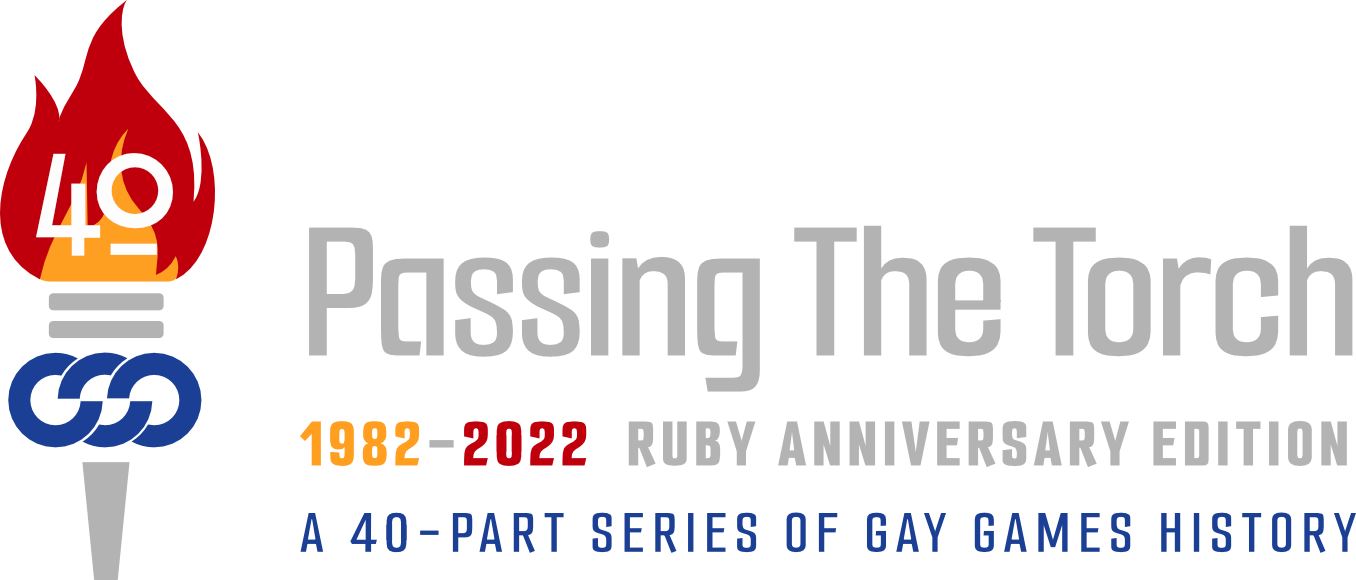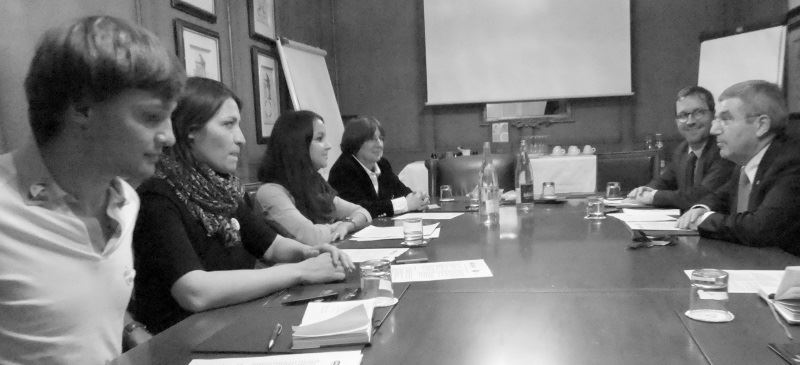FGG and IOC: Finding Common Ground

Produced and curated by Federation of Gay Games Archivist Doug Litwin and FGG Honourary Life Member Shamey Cramer
with Ankush Gupta, FGG Officer of Communications
Read the entire "Passing The Torch" series as it is posted daily HERE.
Post 20 of 40 - 16 August - FGG and IOC: Finding Common Ground
“Passing The Torch: Ruby Anniversary Edition” is a factual timeline of the major events that have been part of the Gay Games evolution since its inception. The series will run from 28 July 2022 - one month before the 40th anniversary of the original Opening Ceremony at San Francisco’s Kezar Stadium - through 5 September, the anniversary of Gay Games I Closing Ceremony. All postings will remain online and available for viewing at the FGG website.
* * *
Meeting of the Federation of Gay Games and the International Olympic Committee Paris, November 30, 2013
By Emy Ritt, President Emeritus and FGG Honourary Life Member
This article is dedicated to the late Marc Naimark, FGG Vice President, External Affairs.
Founded by an Olympic athlete and subsequently taken to court by the United States Olympic Committee even before the first Gay Games had actually taken place, over thirty years and a series of well-timed circumstances would be needed to result in what some might call a ‘Forrest Gump moment’ when the Federation of Gay Games found themselves ‘in the room’ with the President of the International Olympic Committee.
FIRST: The first synchronistic event leading up to the historic FGG-IOC meeting took place in 2005 when Cologne was selected to host the 2010 Gay Games. Thanks to Cologne’s Head of Communications, Jochen Färber, who travelled to Paris on a regular basis for his work with Eurosport, we (Paris-based Emy Ritt and the late Marc Naimark), met on a regular basis with Jochen to discuss plans for the Cologne’s Gay Games and to get to know each other. Jochen also worked for the International Fencing Federation managing events in Germany and around the world. In fact, in November 2010, we were invited by Jochen to attend the World Fencing Championships in Paris.
SECOND: Little did we know that a few years later in 2013, Jochen Färber would be appointed Chief of Staff for a former Olympic fencer from Germany, Thomas Bach, who had just been elected as the new President of the International Olympic Committee. This was the second synchronistic event that led to the historic FGG-IOC meeting.
THIRD: Meanwhile, reactions to the upcoming 2014 Olympic and Paralympic Winter Games in Sochi (Russia) had been heating up, so to speak. Marc Naimark, FGG’s man behind the scenes, posted articles and information on a very frequent basis about discussions around the world concerning the repressive anti-LGBT+ policies of the Sochi host government. The local Russian LGBT+ political activists were also very vocal on social media, especially regarding what they viewed as the IOC’s complicity with Russia and their repression of human rights. Mainstream media was very active in related political discussions concerning the Sochi Winter Olympics and Paralympics.
The Russian LGBT+ Sports Federation, a loyal FGG member organization, was planning the first ever Open Games in Moscow to promote diversity and equality and scheduled during the ten-10 day pause between the Olympic and Paralympic events.
With Thomas Bach becoming the new IOC President on 10 September 2013, and Jochen Färber, a former Cologne Gay Games Communications Director, named as his Chief of Staff on 18 October 2013, the IOC was well- placed to address concerns about LGBT+ human rights at the Sochi Winter Olympics. This was the third synchronistic event to contribute to the historic FGG-IOC meeting.

FGG-IOC Meeting on 30 November 2013. From left, Konstantin Yablotskiy, Elvina Yuvakaeva, Anastasia Smirnova, Emy Ritt, Jochen Färber, Thomas Bach. Not seen is Marc Naimark, who is taking the photo, and Mark Adams, who is to the right of Mr. Bach. Photo Credit: Marc Naimark
.jpg)
Presentation of Gay Games Medal to IOC President, Thomas Bach by FGG Co-President Emeritus, Emy Ritt. Photo Credit: Mark Naimark
THE MEETING: Although Jochen was not slated to officially start his new IOC job until 1 December 2013, he contacted FGG in early November to suggest that we participate in a meeting with IOC President Bach with representatives of the Russian LGBT+ Sports Federation and other Russian activist groups. IOC President Thomas Bach, a former Olympic fencer and medal winner, was already scheduled to be in Paris for the 100th Anniversary Gala Dinner of the International Fencing Federation (FIE) on 30 November. Once again, the sport of fencing was helping to bring key people together. This was the third synchronistic event to contribute to the FGG- IOC meeting.
In a matter of days, Jochen had managed to confirm the FGG-IOC meeting for Saturday, 30 November, secure a meeting room at a Paris hotel, contact the relevant participants, and organize their transportation and accommodation for those traveling from Russia.
Despite his busy schedule, which included meeting with the then French President, François Hollande, IOC President Thomas Bach spent more than an hour with Federation of Gay Games representatives, Emy Ritt and Marc Naimark, and the Russian LGBT Sports Federation’s Co-Presidents, Elvina Yuvakaeva and Konstantin Yablotskiy, and the Spokesperson for the Russian LGBT Activist Coalition, Anastasia Smirnova. Accompanying Bach were his soon-to-be new Chief of Staff, Jochen Färber, and IOC Director of Communications, Mark Adams.
The topics discussed during the meeting focused on the repression of the LGBT+ community in Russia. Reactions from the meeting participants to the historic FGG-IOC meeting were varied, interesting, and in some cases, very prescient, as described below in excerpts from articles written by the late Marc Naimark and journalists from around the world. See below:
- The IOC confirmed that "a constructive meeting" had taken place.
- FGG Vice-President of External Affairs, Marc Naimark, who was thrilled with the meeting and optimistic about future conversations, stated: "I know that our friends from the Russian LGBT Sports Federation were disappointed that no actions were announced at the end of the meeting, but that's not what this encounter was about," Naimark said. "The IOC expressed their desire as a sports organization to talk about LGBT issues with LGBT sports bodies. This is a real opportunity to promote our shared values of sport for all and sport free from discrimination."
- Emy Ritt, FGG Co-President Emeritus, applauded the efforts of the IOC to engage with LGBT sport organizations. “We appreciate the courage and leadership of the IOC’s President, Thomas Bach, in making this meeting happen. For the Gay Games, born in conflict with the Olympic Movement, this evolution is particularly meaningful. We will be inviting both the USOC and the IOC to join us in Cleveland and Akron this August for the 2014 Gay Games. To see them there would be an encouraging sign that the Olympic Movement truly does value the Gay Games principles of “Participation, Inclusion, and Personal Best”.
- Elvina Yuvakaeva, Co-President of the Russian Open Games, explained to Mr. Bach the increasing difficulties in obtaining venues for their sporting events due to the ever-present repression of the LGBT+ community. She feared that after the Olympics and Paralympics, when the attention from the international public would decrease, homophobic repression would become even worse, with, for example, the reintroduction of the bill to remove children from gay parents. Elvina felt that the first Open Games would most probably be the last event in which Russian LGBT athletes would be able to compete in their own country. A letter of support was requested from Mr. Bach, the IOC President, both to help obtain venues and to potentially ward off some of the expected violence during the Open Games, as witnessed during previous LGBT+ events in Russia, such as the Side by Side film festival in St Petersburg.
- Konstantin Yablotskiy recalled the key issues regarding Sochi: “We expressed our desire for a safe space for LGBT people at the Sochi Games. At the Vancouver and London Olympics, Pride Houses were organized by the LGBT sports community, but in Sochi, our government has banned such initiatives. We still hope that the IOC will be able to intervene to demonstrate its commitment to sport for all and to the values of the Olympic Charter.”
WITH GRATITUDE: The humble author of this article still finds it hard to believe that I had been part of such an historic moment of the Gay Games movement, and what a privilege it was!
* * *
Read more about this historic meeting at Outsports.com and on InsideTheGames.com
Read the entire "Passing The Torch" series as it is posted daily HERE.
